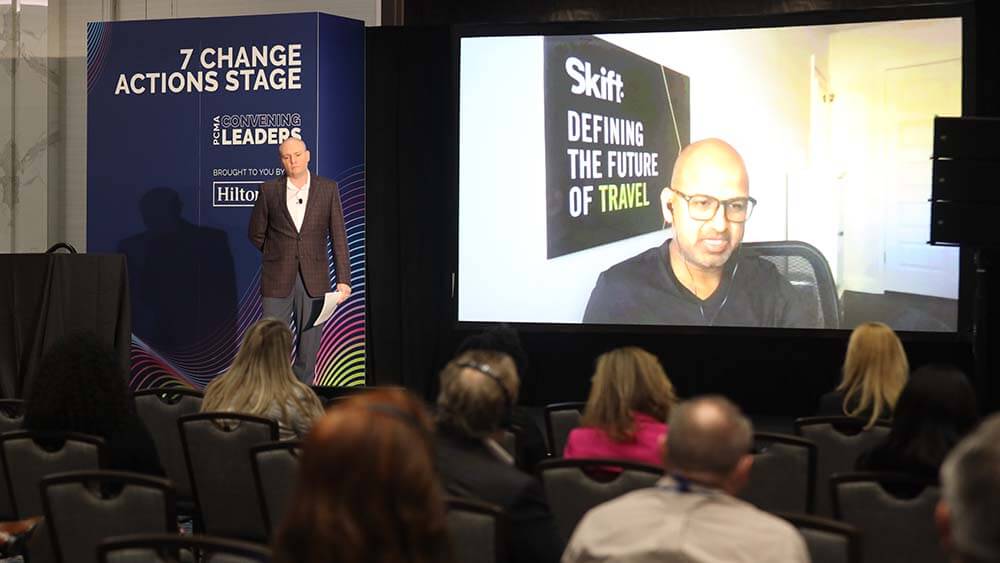
Rafat Ali, founder and CEO of Skift (on screen), speaks during a Convening Leaders session while moderator Joshua Butler, the cofounder and COO of Falcon Events, and in-person attendees listen from Las Vegas. (Jacob Slaton Photography)
If the pandemic-spawned Zoom boom was the event industry’s Napster moment, then we are at the precipice of a new age of events — whether we like it or not, says Rafat Ali, founder and CEO of Skift.
In the Convening Leaders session, “Transforming During Disruption: Confronting Business Events’ Napster Moment,” Ali dove into how digital disruption transformed several industries, including newspapers, music and radio, movies and TV, gaming, books, visual media, and dating. “The connecting thread among all of these industries is content,” Ali said in the session, which was moderated by Joshua Butler, the cofounder and COO of Falcon Events. “We all have learned lessons that are common across these industries that, for the events industry, is worth looking at.”
One of the biggest learnings Ali expanded on is how the cyclical nature of business demands that incumbents stay competitive and aren’t too quick to overlook disruptors. A prime example — the unbundling of traditional cable companies and the rise of streaming platforms like Netflix. Those that were quick to adapt, like the several networks that banded together to form Hulu, survived and thrived. Others, like Time Warner Cable, no longer exist.
Watch CL22 Sessions
Convening Leaders 2022 attendees, don’t miss your chance to peek behind-the-scenes in our MashUp Studios, or re-watch the Main Stage and other sessions for education credits in JUNO’s CL22 Library. On-demand access to CL22 content is available through March 12, 2022.
“[This] is why the next five to 10 years is going to be so fascinating for the event industry — we’re in a bit of an unbundling phase,” Ali said. At some point, he continued, companies will bundle again but it will be completely different from previous iterations. This is good news for event and trade show organizers, as “at the end of the day, they still may win out but will have a completely different offering.”
A New Age
Ali pointed out that Zoom’s fast and (mostly) free video tech platform represents the power of “good enough,” not dissimilar to Napster’s free downloading software. But “that’s where it starts; there is so much tech to be built in the events industry,” he said. In addition to new platforms, technology will continue to rapidly reshape the way we meet in the digital space, perhaps quicker than we think. Startup Portl recently unveiled its latest device that will allow users to broadcast 3-D replicas of themselves, and NVIDIA’s keynote at its November 2021 GTC conference is a prime example of how augmented reality blurs the virtual and the real worlds in a way that is almost seamless to the viewer.
“We are at the dawn of a new age of interaction tech,” Ali said, adding that this applies to everything, not just events. “There are new behaviors yet to be born.” Butler agreed, highlighting the iPhone as an example. He said the events industry has yet to have its big iPhone moment, but when we do, “it’s going to be some sort of combination of hardware and software that changes the way attendees view events.”
In the end, it will come down to one thing: “In general, people want choice and they want control over their choices,” said Ali. “It’s all going to affect the event industry, and for us to say that we are going to go back to physical events seems like we’re not learning the lessons of a lot of other industries. There is always going to be a need for events — but what it looks like? In many ways,” Ali said, it’s up to us to learn from the examples set by other industries.
Jennifer N. Dienst is managing editor of Convene.
